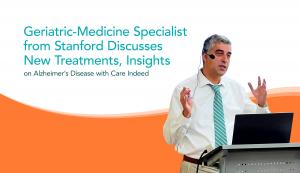Geriatric-Medicine Specialist from Stanford Discusses New Treatments, Insights on Alzheimer’s Disease with Care Indeed
Dr. Mehrdad Ayati shares information on new Alzheimer’s medications, the brain’s normal aging process and what we can all do to maintain brain health as we age.
The talk comes as governments around the world report the rapid aging of their populations. By 2040 for example, local government authorities estimate that the number of Bay Area residents aged 65 or older will have increased 137% from 2010—a growth rate that is more than four times higher than in any other age groups.
Care Indeed, which provides compassionate and innovative home care solutions to the Bay Area, frequently hosts events to increase awareness and care for various forms of dementia by providing its clients and their families with direct access to health experts.
Dr. Ayati, an adjunct professor at Stanford Medicine who advocates innovative and practical solutions to promote health among the elderly, outlined current and new medications to treat Alzheimer’s disease—as well as things anyone can do to maintain health during aging.
Untreated high blood pressure, for example, can accelerate normal age-related brain decline, Dr. Ayati explained, while getting blood pressure under control can help avoid such unnecessary damage. Quickly addressing hearing loss can likewise avoid accelerated memory loss—by keeping the brain region that controls hearing from taking vital resources away from the part of the brain where memory is centered.
While acknowledging that “There is not a cure for Alzheimer’s—it’s about slowing the progress,” Dr. Ayati overviewed existing and new medications for the disease—from conventional treatments such as Galantamine, Rivastigmine and Donepezil, through to recently approved medications such as Aducanumab.
Like most medications, all the ones that Dr. Ayati discussed carry a risk of side effects—from diarrhea to brain swelling—and are appropriate for only some patients. People taking blood thinners or those with advanced Alzheimer’s, for example, are unlikely to qualify for such medications.
“It was so valuable the way Dr. Ayati laid out everything from the history of Alzheimer’s to its current controversies,” said Vanessa Valerio, the registered nurse who is Care Indeed’s Chief Operating Officer. “We really appreciate his timely insights,”
As part of the national community working to end Alzheimer’s disease, Care Indeed is participating in the Alzheimer’s Association Walk to End Alzheimer’s on September 28. To donate or register to walk with us next month, we invite you to sign up here: https://careindeed.info/CIMemoryKeepers. For more information about this event, or Care Indeed and its many services, please call us at (650) 352-4007 or email us at intake@careindeed.com.
Jana Aguilar
Care Indeed
+1 650-658-0504
email us here
Visit us on social media:
Facebook
X
LinkedIn
Instagram
YouTube
Legal Disclaimer:
EIN Presswire provides this news content "as is" without warranty of any kind. We do not accept any responsibility or liability for the accuracy, content, images, videos, licenses, completeness, legality, or reliability of the information contained in this article. If you have any complaints or copyright issues related to this article, kindly contact the author above.

